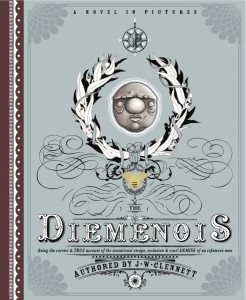Graphic Novel
Hunter Publishers
December 2015
Hardback
$39.95
 Like anyone who survived the same public school education that I did, I’d hazard to say I know more about ancient Egypt, dinosaurs, and the social and political environments that led to the first and second world wars than I do about Australian history.
Like anyone who survived the same public school education that I did, I’d hazard to say I know more about ancient Egypt, dinosaurs, and the social and political environments that led to the first and second world wars than I do about Australian history.
What I do remember of my schooling on Australia’s history can be listed thusly:
Pangaea, Gondwanaland, Megafauna, Dreamtime, human fire-clearing practice leading to the evolution of fire-dependent flora, Abel Tasman, First Fleet, Convicts, Burke and Wills.
Vicious colonisation, genocide, bloody massacres were mentioned, sure, but in a kind of blink-and-you´ll-miss-the-whole-apartheid-thing way. It’s enough to suspect some sort of government conspiracy of silence on our shameful past. Hmm.
That is also why it was not until the 2012 ‘Napoleon: Revolution to Empire’ exhibition at the National Gallery of Victoria that I realized the extent of French involvement in the European exploration of our great southern land. I tell you, finding out that French Island is named French Island because some French dude named it Ile des Français was mind-blowing. That French dude, incidentally, was Jacques Hamelin who was part of the scientific expedition under the command of Nicholas Baudin.
One wonders if that expedition had a bit more of a political bent, if Napoleon had not fallen, if the Frenchies had been just that wee bit faster and sneakier than Flinders and his gang—who they met as they mapped the south—would we here in Terre Napoleon have a much sexier accent than our northern neighbours? Would we be the southern hemisphere’s Quebec? Would we tut at those New South Welsh tourists as they butcher their way through an order at a restaurant? It is possible, no.
The Diemenois is a remarkable alternate history, both of the settlement of Tasmania and the ultimate fate of Napoleon… or possible ultimate fate of Napoleon. Maybe.
It posits a French colony in the west of Tasmania called la Ville de Baudin to which a mysterious man travels in secrecy from what appears to be his deathbed on May 5th 1821, to what suspiciously appears to be (and yes, I stared and compared for a good long while) the west coast of St Helena. From there he embarks on a perilous journey that eventually brings him to a reimagined version of our shores.
In la Ville de Baudin this mysterious man is known as Henri Maurice Claudet. A secretive resident and someone who gives employ to the disenfranchised, the lost and the vulnerable. This graphic novel pieces together little snippets in the lives of many of the denizens of Baudin and their connection to the life of Claudet, and those of his servants and his enemies.
Claudet’s story is interwoven with and filled in with the modern day notes of an amateur historian whose research into Claudet lead him to believe that Napoleon did not die on St Helena but instead escaped and set up a new and secluded life in Van Diemen Ouest. Here he kept himself to himself and surrounded himself with other outcasts. Though a portrait of a violent colonial time—from the vicious massacre of Tasmanian aboriginals to calculated assassination—it is no more violent than Australia’s actual horrific past.
Though fiction, JW Clennett creates a narrative so convincing I admit I put Google to use a few times in order to sort fact from fantasy*. The story is formed from correspondence, newspaper clippings, legal depositions, eyewitness stories, and book extracts scattered amid the darkly endearing illustrations. By the last few pages I was bowed over in anticipation as I raced toward the heart-wrenching conclusion.
As we have just passed another contentious and controversial Australia Day, it might be of interest to leave you with a snippet of Nicolas Baudin’s views on colonisation in one of his letters to Governor King. Though in his own words, he is not a politician but a practical man, how different may the world have been had more men like Baudin been in positions of power.
“To my way of thinking, I have never been able to conceive that there was any justice or even fairness on the part of Europeans in seizing, in the name of their government, a land they have seen for the first time when it is inhabited by men who did not always deserve the titles of “savages” and “cannibals” that have been lavished on them, whereas they were still only nature’s children and no more uncivilised than your Scottish Highlanders of today or our peasants of Lower Brittany…It thus follows that not only do you have an injustice to reproach yourself with in seizing their land but you have also transported to a land, where the crimes and diseases of Europeans were unknown, everything that could retard the progress of civilization.”
Nicolas Baudin to Governor King, 24 December 1802
From the Historical Records of New South Wales (F.M. Bladen, ed.)
*See aforementioned poor schooling in Australian history

